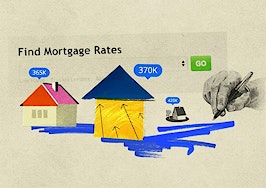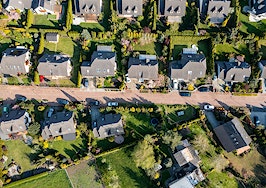In these times, double down — on your skills, on your knowledge, on you. Join us Aug. 8-10 at Inman Connect Las Vegas to lean into the shift and learn from the best. Get your ticket now for the best price.
Rebounding mortgage rates have cooled homebuyer demand for mortgages to the lowest level since 1995, according to a weekly survey of lenders by the Mortgage Bankers Association.
The MBA’s Weekly Mortgage Applications Survey shows demand for purchase mortgages was down a seasonally adjusted 18 percent last week when compared to the week before and 41 percent from a year ago.
Although requests to refinance existing loans fell just 2 percent week over week, refi applications were down 72 percent from a year ago.

Joel Kan
“This time of the year is typically when purchase activity ramps up, but over the past two weeks, rates have increased significantly as financial markets digest data on inflation cooling at a slower pace than expected,” MBA Deputy Chief Economist Joel Kan said in a statement. “The increase in mortgage rates has put many homebuyers back on the sidelines once again, especially first-time homebuyers who are most sensitive to affordability challenges and the impact of higher rates.”
With rates on the rise, requests for adjustable-rate mortgage (ARM) loans increased to 7.6 percent of total applications, the MBA survey found. Applications to refinance accounted for 32.5 percent of total applications, up from 32 percent the week before.
Mortgage rates, which started off the year continuing to retreat from 2022 highs, have been climbing in recent weeks on stronger-than-expected economic data that’s fueled fears of more Federal Reserve rate hikes.
A strong Feb. 3 jobs report surprised many economists, and last week’s Consumer Price Index (CPI) readout shows inflation cooled only slightly in January.
According to loan lock data tracked daily by Optimal Blue, rates on 30-year fixed-rate conforming mortgages have climbed steadily from a 2023 low of 5.98 percent registered Feb. 2, hitting a 2023 high of 6.64 percent Tuesday.
In the long run, economists expect mortgage rates to come back down — particularly if growth slows and the economy enters a recession.
In their latest forecast, economists at mortgage giant Fannie Mae said they expect the U.S. to enter a “modest recession” during the second quarter, setting the stage for mortgage rates to ease and for home sales to rebound in 2024.
Recession could set stage for mortgage rates to ease

Projected rates for 30-year fixed-rate mortgages |Source: February forecasts by Fannie Mae and the Mortgage Bankers Association
Fannie Mae forecasters predict rates for 30-year fixed-rate mortgages will drop back below 6 percent in the second half of 2023 and continue falling to 5.1 percent by the end of next year. Economists at the Mortgage Bankers Association forecast an even sharper drop, with mortgage rates falling below 5 percent in mid-2024.
For the week ending Feb. 17, the MBA reported average rates for the following types of loans:
- Rates for 30-year fixed-rate conforming mortgages (loan balances of $726,200 or less) averaged 6.62 percent, up from 6.39 percent the week before. With points increasing to 0.75 from 0.70 (including the origination fee) for 80 percent loan-to-value ratio (LTV) loans, the effective rate also increased.
- For 30-year fixed-rate jumbo mortgages (loan balances greater than $726,200), rates averaged 6.44 percent, up from 6.26 percent the week before. With points increasing to 0.53 from 0.43 (including the origination fee) for 80 percent LTV loans, the effective rate also increased.
- Rates for 30-year fixed-rate FHA mortgages averaged 6.39 percent, up from 6.25 percent the week before. With points increasing to 1.16 from 1.14 (including the origination fee) for 80 percent LTV loans, the effective rate also increased.
- For 15-year fixed-rate mortgages, rates averaged 5.98 percent, up from 5.85 percent the week before. With points increasing to 0.93 from 0.81 (including the origination fee) for 80 percent LTV loans, the effective rate also increased.
- Rates for 5/1 ARM loans averaged 5.66 percent, up from 5.53 percent the week before. With points increasing to 0.97 from 0.72 (including the origination fee) for 80 percent LTV loans, the effective rate also increased.
Get Inman’s Extra Credit Newsletter delivered right to your inbox. A weekly roundup of all the biggest news in the world of mortgages and closings delivered every Wednesday. Click here to subscribe.













